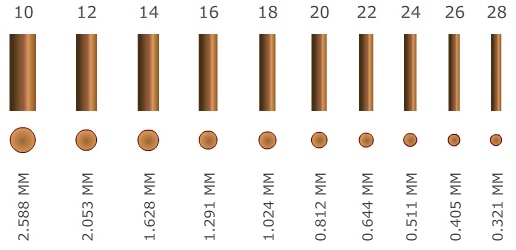
Choosing a wire gauge that can handle the amount of electric current your sound system will draw is important.įor low-power systems, like your standard car or home speakers, an 18-gauge wire should be just fine. It’s better to be safe than sorry, right? Power of Your Sound SystemĪnother essential factor to think about is the power of your sound system. I always err on caution with a slightly thicker gauge wire for those lengthy runs. It’s important to remember that the longer you run your cable, the more resistance your audio signal will encounter along the way. The longer the wire, the thicker (higher gauge) it should be. When picking out speaker wire, one of the critical factors to consider is the length of cable you’ll need.
4 GAUGE SPEAKER WIRE HOW TO
RELATED How to Wire an Aux Cable to a Speakerįactors to Consider When Choosing Speaker Wireīelow are some factors to consider to help you even further to choosing gauge wire for your speakers: Length of Cable It’ll make your audio system sound amazing, and that’s what we all want. The takeaway is simple: choose the right wire gauge for your setup. It’s good for about 50 watts for 4 ohm and 100 watts for 8-ohm loudspeakers, up to 50 feet (15 m) or 100 feet (30 m). For low-power home or car speakers (not subwoofers), an 18-gauge wire is perfectly fine. Lower Gauge (Thicker Wires): Less resistance, allowing better performance.īut don’t worry you don’t always need the thickest wire on the market.Higher Gauge (Thinner Wires): More resistance, potentially affecting sound quality.You see, the higher the gauge (meaning thinner wires), the more resistance in the wire.Īnd as an audiophile, you want to minimize speaker cable resistance. Now, why should we care about the gauge? Well, it’s all about resistance. Thinner wire (higher AWG number) is easier to work with but has higher resistance and can limit your sound quality at longer distances.Thicker wire (lower AWG number) can handle more power and lower resistance.The wire gauge can impact your speakers’ sound quality and performance. Now, you might be wondering why this matters. This system measures the thickness of the wire, with lower numbers meaning a thicker wire and higher numbers a thinner one. One of the most important things you need to know about speaker wire is the gauge – it’s all about the American Wire Gauge (AWG) system.

Not ideal for high-quality sound and high-powered systems Suitable for up to 50 watts for 4-ohm speakers and 100 watts for 8-ohm speakers (distances up to 50 feet)Īffordable and reliable for small systems and tight spaces Low-power setups, small home or car speakers (not subwoofers) Not the best for high-power systems possible sound quality loss and heat generation It might not be best for super high-powered systemsĮveryday low-power audio needs short wire runsĮasy to bend and install, moderate power output It might be overkill for small, low-powered systems harder to work with Overview of Popular Speaker Wire Gauges Speaker Wire Gauge Factors to Consider When Choosing Speaker Wire.Recommended Wire Gauge Based on Speaker Power and Distance.Overview of Popular Speaker Wire Gauges.


 0 kommentar(er)
0 kommentar(er)
